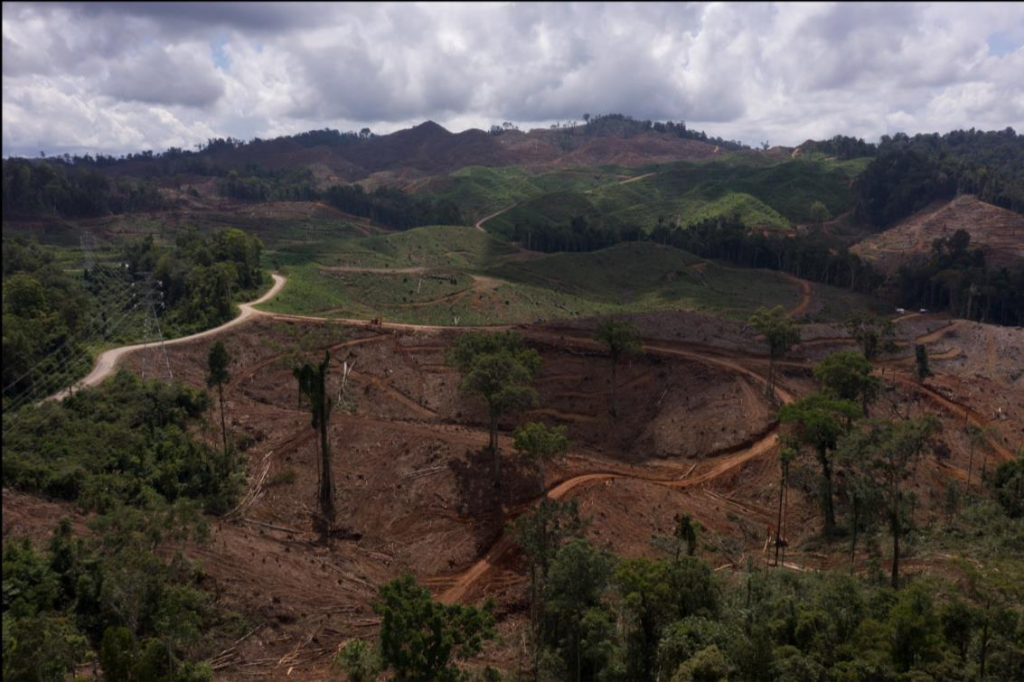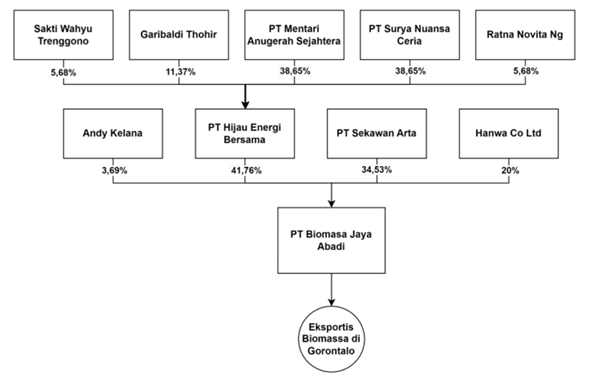
Gorontalo, October 21st, 2024. The environmental crisis in Gorontalo is becoming increasingly alarming with plans for a biomass-based energy transition project that will convert 282,100 hectares of forest in the province. This project, promoted as a solution for energy transition, is instead evaluated as a significant threat to environmental sustainability and the welfare of local communities. The #SaveGorontalo Coalition, comprising several civil society organizations, argues that this project is merely a greenwashing effort by corporations and the government that disregards both ecological and social impacts.
During a commemoration of International Big Bad Biomass Day on October 21, 2024, under the Menara Keagungan Limboto, the #SaveGorontalo Coalition strongly voiced its protests. They strongly oppose the biomass project that will clear forests and replace them with fast-growing plants only to be burned alongside fossil fuels. Renal Husa, spokesperson for the coalition, stated that claims of renewable energy from this project are nothing but an illusion. “There is nothing sustainable about practices that involve deforestation and ecosystem destruction for short-term profits”, he said.
Through the International Big Bad Biomass Day action, the #SaveGorontalo Coalition condemned the biomass project in Gorontalo that threatens 282,100 hectares of forest. This project is merely giving the illusion of energy transition that harms ecosystems for short-term gains. This action firmly rejects the use of forests for fast-growing plants that will then be burned with fossil fuels.
This situation proves that the increasing threat to biodiversity, especially in the Popayato-Paguat landscape, which is a habitat for endemic species. Dr. Terri Repi from Muhammadiyah University of Gorontalo explained that this bioenergy project endangers biodiversity, which is crucial for the ecosystem.
“This threatens the survival of many species, especially endemic species and those requiring specific habitats. The bioenergy project in Pohuwato Regency poses a serious threat to the Popayato-Paguat landscape, which includes high conservation value areas, which of course not only store two types of trees but a variety of species”, Dr. Terri stated.
On another note, Simpul WALHI Gorontalo also highlighted that the project’s concession area is located in a disaster-prone zone, potentially worsening the ecological risks for surrounding communities. “If energy plantations massively clear the forests, it will lead to, or even worsen the impact of ecological disaster that will destroy the living space and livelihoods of local communities around the concession,” said Defri Sofyan, dynamizer from Simpul WALHI Gorontalo.
Allegations of Illegal Wood Pellet Exports to Japan and South Korea
Global demand for wood pellets exported from Gorontalo continues to rise, with the province accounting for 71% of national exports. Despite increasing export volumes, data from Forest Watch Indonesia (FWI) reveals that these significant profits do not benefit local communities, who instead have to face environmental impacts from the exploitation of their forests.
This export activity largely involves wood pellets, suspected to come from illegal deforestation in Gorontalo, which are then shipped to countries like Japan and South Korea. Anggi Putra Prayoga, Manager of Communications, Cooperation, and Policy Division at Forest Watch Indonesia, supports this suspicion.
“In Gorontalo, we suspect that illegal wood pellet exports have been carried out to Japan and South Korea as part of planned deforestation. Natural forests are being ruthlessly exploited to meet international demand for renewable energy. Ironically, this creates a paradox for Indonesia’s forests, which are being destroyed to power foreign countries amid the global energy transition”, he said.
Further investigation by Trend Asia revealed that Japan’s involvement in the wood pellet supply chain is systemic, with the presence of Japanese nationals serving as commissioners at PT BJA and Hanwa Co. Ltd, which has shares in PT Biomassa Jaya Abadi (BJA). “Analysis of the beneficial owners of PT BJA indicates involvement of politically exposed persons such as Sakti Wahyu Trenggono, Minister of Maritime Affairs and Fisheries, and businessman Garibaldi Thohir, who is the brother of the Minister of State-Owned Enterprises, Erick Thohir. These names are now linked to large-scale deforestation practices occurring in Gorontalo,” said Amalya Reza, Bioenergy Campaigner at Trend Asia.
The coalition also found evidence of illegal transshipment activities occurring outside official permits in the waters of Pohuwato. This activity, which involves transferring cargo from ship to foreign vessels, is suspected to involve money laundering practices and falsification of wood legality documents (SVLK), concealing the origins of timber from illegal logging. This raises broader concerns that such operations not only harm the environment but also involve larger illegal business practices. Transshipment is often used as a loophole to evade laws, paving the way for greater violations.
The establishment of energy plantations and deforestation in natural forests exemplifies how companies are harming the environment and threatening the spaces and livelihoods of local communities. Through the reflection action of International Big Bad Biomass Day, it becomes an important moment to convey the message that Gorontalo being the source of the biomass trade supply chain is a disaster for local communities. Renal Nusa stated, “During this moment, we want to rally broad public support while demanding that this biomass project be halted immediately.”
Gorontalo Under the Grip of Bioenergy Projects
Indonesia’s energy transition will not succeed if it continues to harm nature landscapes, posing challenges for policies like FoLU Net Sink 2030. While the government targets rehabilitation of millions of hectares of land, the actual realization is only around 30 thousand hectares per year, which means that it would take over 1,000 years to complete at this rate.
In this context, PT Inti Global Laksana (IGL) and PT Banyan Tumbuh Lestari (BTL) have come under scrutiny. These companies operate under permits from the Ministry of Environment and Forestry (KLHK), but an investigative report from Forest Watch Indonesia (FWI) reveals that they are involved in land clearing to obtain natural wood for wood pellet production. This contradicts the objectives of rehabilitation and forest protection, which should be the primary focus.
These companies operate under SK.3102/MENLHK-PSKL/PKTHA/PSL.1/5/2020 with an area of 11,860 Ha and SK.3103/MENLHK-PSKL/PKTHA/PSL.1/5/2020 with an area of 15,493 Ha. However, investigations by Forest Watch Indonesia (FWI) show that the wood pellet industry is harvesting natural wood as raw material, not from rehabilitated or planted wood. They do this through land clearing. An official report from the certification body PT Equality Indonesia revealed that the industrial company only harvested two types of trees, namely Jambu-Jambu and Nyatoh. In exports number 22, the types of wood harvested directly changed to six types dated August 26, 2024.
FWI data shows that deforestation within the concessions of PT IGL and BTL from 2021 to 2023 totaled 1,087.25 Ha. Of the concession area supplying natural wood for PT BJA, about 65 percent is still natural forest. FWI defines the remaining natural forests within these two concessions as part of the planned deforestation scheme by KLHK.
This is inconsistent with Indonesia’s energy transition agenda, which does not utilize natural forest wood as raw material for bioenergy. This practice demonstrates that the steps taken in Indonesia’s energy transition have not fully considered the ecological and social impacts involved.
Appendix
Corporate Structure of PT Biomasa Jaya Abadi (BJA)
PT BJA is a biomass exporter (wood pellets and similar products). The wood source from natural forests is obtained from several companies, including PT Inti Global Laksana and PT Banyan Tumbuh Lestari.
PT BJA is a company formed by several enterprises. Based on company profile data from the Directorate General of General Legal Administration (AHU) at the Ministry of Law and Human Rights, the shareholders of PT BJA include PT Hijau Energi Bersama (41.76%), PT Sekawan Artha Lestari (34.53%), Hanwa Co Ltd (20%), and Andy Kelana (3.69%). Here, PT Hijau Energi Bersama is the majority shareholder.
According to the company profile, several national business figures and ministry officials are shareholders of PT Hijau Energi Bersama. They include Garibaldi Thohir, the brother of the Minister of State-Owned Enterprises, holding (11.37%), and Wahyu Sakti Trenggono, Minister of Maritime Affairs and Fisheries, holding (5.68%).

Methodology & Disclaimer
The methodology for determining the corporate structure uses data from the Directorate General of General Legal Administration (AHU) at the Ministry of Law and Human Rights. Data and information about the company and its shareholders come from the Ditjen AHU data. The researcher is not responsible for errors in data presented by the Ditjen AHU as a third party in this research. Meanwhile, to determine the background of the shareholders, the researcher uses relevant public sources available on various official company and government websites.
Contact Person
Coalition Spokesman: Renal Husa +62 821-9578-6820
FWI Media: +62 857-2034-6154
****



